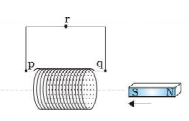Suppose that the electric field part of an electromagnetic wave in vacuum is E = + . What is the direction of propagation?Solution in Punjabi
Step by step video & image solution for Suppose that the electric field part of an electromagnetic wave in vacuum is E = {(3.1 N//C) cos [(1.8 rad//m) y + (5.4 xx 10^6 rad//s)t]} hati . What is the direction of propagation? by Physics experts to help you in doubts & scoring excellent marks in Class 12 exams.
Updated on:21/07/2023Topper's Solved these Questions
Similar Questions
Predict the direction of induced current in the situations described by the following Fig:

View SolutionTwo charges 5×10−8C and −3×10−8C are located 16 cm apart. At what point(s) on the line joining the two charges is the electric potential zero? Take the potential at infinity to be zero.
View SolutionThe electric field part of an electromagnetic wave in vacuum is E=3.1(N)/(C)cos[(1.8("rad")/("m"))y+(5.4xx10^(8)("rad")/(s))t]hati The wavelength of this part of electromagnetic wave is
View SolutionSuppose that the electric field part of an electromagnetic wave in vacuum is E={(3.1 N/C) cos [(1.8 rad/m)y+{5.4 xx10^(6) rad/s} t]} i. What is the direction of propagation ?
View SolutionSuppose that the electric field part of an electromagnetic wave in vacuum is E={(3.1 N/C) cos [(1.8 rad/m)y+{5.4×106 rad/s} t]} i.
What is the wavelength λ ?
View SolutionSuppose that the electric field part of an electromagnetic wave in vacuum is E={(3.1 N/C) cos [(1.8 rad/m)y+{5.4×106 rad/s} t]} i.
What is the frequency v ?
View SolutionSuppose that the electric field part of an electromagnetic wave in vacuum is E={(3.1 N/C) cos [(1.8 rad/m)y+{5.4×106 rad/s} t]} i.
What is the amplitude of the magnetic field part of the wave ?
View SolutionSuppose that the electric field part of an electromagnetic wave in vacuum is
→E=[(3.1N.C−1)cos{1.8rad.m−1)y+(5.4×106rad.s−1)t}]ˆi
What is the direction of propagation?
View SolutionSuppose that the electric field part of an electromagnetic wave in vacuum is
→E=[(3.1N.C−1)cos{1.8rad.m−1)y+(5.4×106rad.s−1)t}]ˆi
What is the wavelength,λ ?
View SolutionSuppose that the electric field part of an electromagnetic wave in vacuum is vecE=[(3.1 N.C^(-1)) "cos"{1.8 "rad" .m^(-1))y+(5.4xx10^6 "rad". s^(-1) ) t}]hati What is the frequency, f?
View SolutionSuppose that the electric field part of an electromagnetic wave in vacuum is vec(E )={(3.1 N//C)cos [(1.8 rad//m)y+(5.4xx10^(6)rad//s)]}hat(i) What is the direction of propagation ?
View SolutionSuppose that the electric field part of an electromagnetic wave in vacuum is vec(E )={(3.1 N//C)cos [(1.8 rad//m)y+(5.4xx10^(6)rad//s)]}hat(i) What is the wavelength lambda ?
View SolutionSuppose that the electric field part of an electromagnetic wave in vacuum is vec(E )={(3.1 N//C)cos [(1.8 rad//m)y+(5.4xx10^(6)rad//s)]}hat(i) What is the frequency v ?
View SolutionThe electric field part of an electromagnetic wave in vacuum is
E=3.1NCcos[(1.8radm)y+(5.4×108rads)t]ˆi
The wavelength of this part of electromagnetic wave is
View SolutionSuppose that the electric field part of an electromagnetic wave in vacuum is E=(3.1NC)cos[(1.8radm)y+(5.4×106rads−1t]ˆi. What is the direction of propagation?
View Solution
